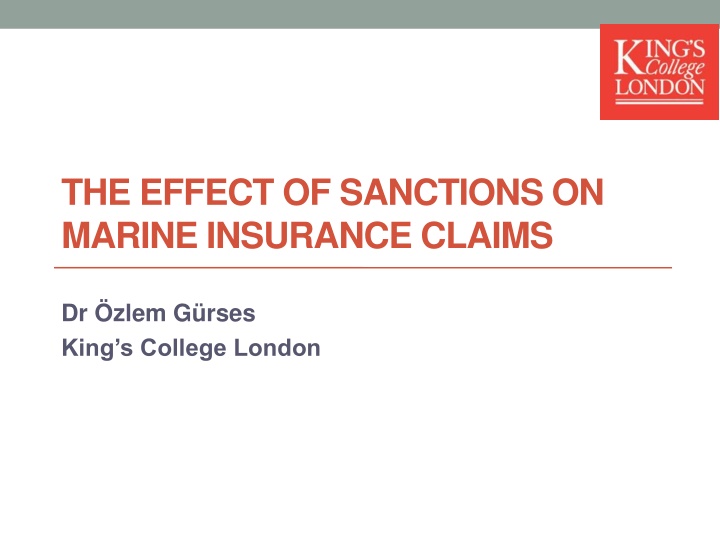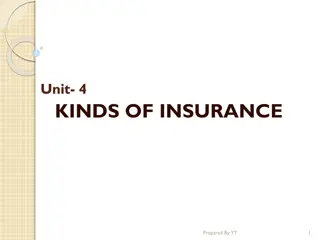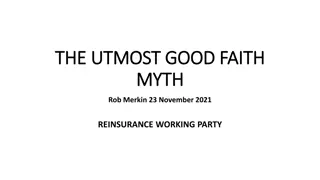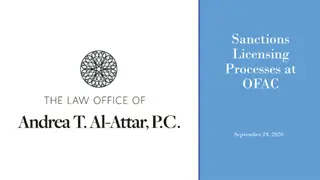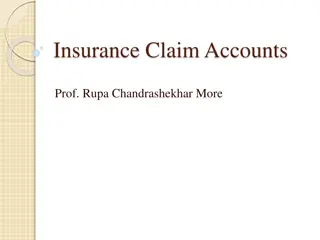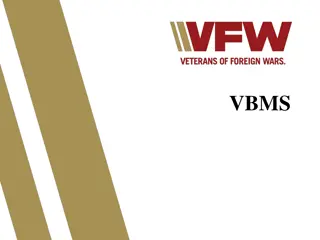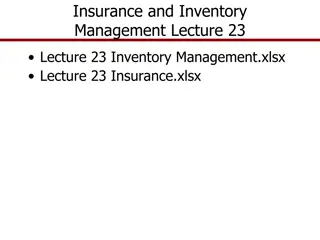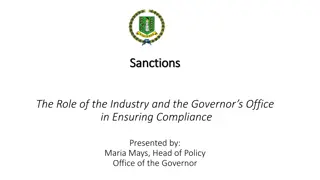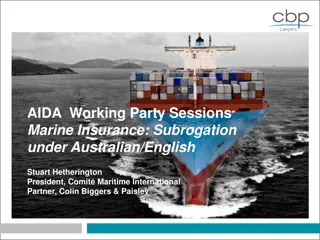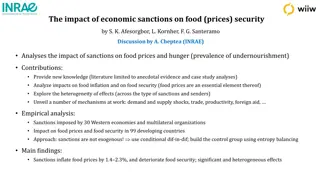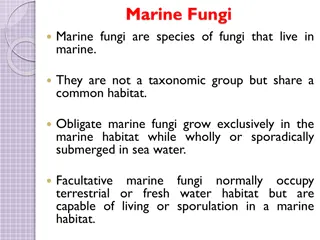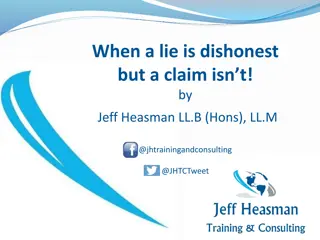Effect of Sanctions on Marine Insurance Claims: Insights from Legal Cases
Delve into the impact of sanctions on marine insurance claims through real-life legal cases and regulatory changes involving Iran, examining the complexities faced by insurers and policyholders in navigating international sanctions regimes.
Download Presentation

Please find below an Image/Link to download the presentation.
The content on the website is provided AS IS for your information and personal use only. It may not be sold, licensed, or shared on other websites without obtaining consent from the author.If you encounter any issues during the download, it is possible that the publisher has removed the file from their server.
You are allowed to download the files provided on this website for personal or commercial use, subject to the condition that they are used lawfully. All files are the property of their respective owners.
The content on the website is provided AS IS for your information and personal use only. It may not be sold, licensed, or shared on other websites without obtaining consent from the author.
E N D
Presentation Transcript
THE EFFECT OF SANCTIONS ON MARINE INSURANCE CLAIMS Dr zlem G rses King s College London
Sanctions against Iran Mamancochet Mining Ltd v Aegis Managing Agency Ltd [2018] EWHC 2643 (Comm) The dispute in Mamancochet concerned a marine policy made before any sanctions had been imposed, giving rise to a loss after the sanctions were imposed and legal proceedings commenced after the US but not the EU had re-imposed the sanctions.
US Sanctions The Iranian Transactions & Sanctions Regulations, 31 C.F.R. Part 560 (ITSR). The ITSR section 560.204: a prohibition on the exportation, re-exportation, sale or supply of goods, technology or services to Iran. The provision of insurance cover constitutes a 'service' within the meaning of section 560.204
ITSR Amendment At the time the Policy attached, the ITSR did not apply to 'US owned or controlled foreign entity' (USCFEs). But change in 2002: the President to enact further legislation bringing USCFEs within the scope of the sanctions regime On 22 October 2012, President Obama exercised the power :From 9 March 2013, USCFEs fell within the scope of the ITSR The insurers would have been prohibited from paying a claim under the Policy.
Joint Comprehensive Plan of Action JCPOA: between Iran, the five permanent members of the UN Security Council and the EU. Iran was to receive relief from various international sanctions USA: sanctions to be lifted in respect of the provision of insurance and re-insurance services from 16 January 2016
The European Union Sanctions Regime Council Regulation (EU) 267/2012: restrictive measures against Iran : that Regulation would not have prohibited the Defendants from paying the claim under the Policy Amending regulation: Council Regulation (EU) 1263/2012 : payment of the claim in the period after 21 December 2012 would have been in breach of EU sanctions.
The EU sanctions JCPOA: the Repealing Regulation payment of the claim by the Defendants on or after 16 January 2016 would not have been prohibited by EU sanctions.
Withdrawal from JCPOA 8 May 2018: President Trump announced the withdrawal of the US from the JCPOA With effect from 27 June 2018; but Wind-down provision until 4 November 2018
The EU "Blocking" Regulation Following President Trump's announcement of the US withdrawal from the JCPOA, Commission Delegated Regulation (EU) 2018/1100 was adopted, amending the Blocking Regulation with effect from 7 August 2018. Legal persons incorporated within the EU was to not comply with any requirement or prohibition from specified foreign laws including US ITRA .
MamancochetMining v Aegis Managing Agency Marine cargo insurance policy governed by English law Cargoes of steel billets, worth about US$3.8m carried from Russia to Iran on 23 August 2012 and 25 August 2012 The goods were stolen from their bonded storage (by presentation of fraudulent documents) at some time between 22 September 2012 and 7 October 2012. Claim against insurers : March 2013
MamancochetMining v Aegis Managing Agency A claim against 30 defendants 19 settled 11 rejected the claim: 2 relied on the EU sanctions only, 9 relied on the US sanctions
The sanctions clause Standard wording developed by the Joint Hull Committee (of the London market) and adopted by the Joint Cargo Committee, provides: "No (re)insurer shall be deemed to provide cover and no (re)insurer shall be liable to pay any claim or provide any benefit hereunder to the extent that the provision of such cover, payment of such claim or provision of such benefit would expose that (re)insurer to any sanction, prohibition or restriction under United Nations resolutions or the trade or economic sanctions, laws, or regulations of the European Union, United Kingdom or the United States of America."
Interpretation The meaning of a contract is that which it would convey to a reasonable person having all the background knowledge which would reasonably have been available to the parties in the situation in which they were at the time of contracting Neither party suggested any particular background or factual matrix which was reasonably available to the parties in 2012.
Dictionary meaning of expose "lay open to something undesirable", "subject to risk" and "leave without protection". The dictionary definition is not determinative of the meaning which the clause as a whole
Interpretation The present clause refers to a payment which "would expose" the insurer "to any sanction, prohibition or restriction".
Interpretation Before a sanction can lawfully be applied there must be conduct which is prohibited. If that is shown then the insurer can fairly be said to be laid open to a sanction, to be at risk of a sanction, or to be left unprotected from a sanction.
Interpretation INSURERS: it was sufficient to show that there was a risk that the agency in question might conclude that there was prohibited conduct (when in law there was not or may not be) and so impose a sanction. Teare J: Clear words would be required to establish a common intention that the insurer need not pay an otherwise valid claim where there was merely a risk that payment would incur a sanction, without having to show that payment was prohibited as a matter of law.
Interpretation The sanctions clause did not mean that once sanctions had been imposed the liability of the insurers to pay a claim had been extinguished The clause clearly stated that its effect was to preclude an obligation to pay only to the extent that payment would expose the insurer to sanctions. The only question, therefore, was whether US or EU sanctions were in force in the period leading up to 4 November 2018.
The wind-down provision The effect of the wind-down provision in the US measures was to permit payment before 4 November 2018. The wind-down provision extended to all transactions that would otherwise have been prohibited whenever they were made.
The EU sanctions The insurance was valid when written and the prohibition on making payments was lifted on 16 January 2016. There was accordingly nothing in EU law to prevent payment and no exposure to sanctions was possible. The Blocking Regulation did not on that reasoning fall for consideration and was not needed to rescue the claimant.
